Greenpeace
Latest
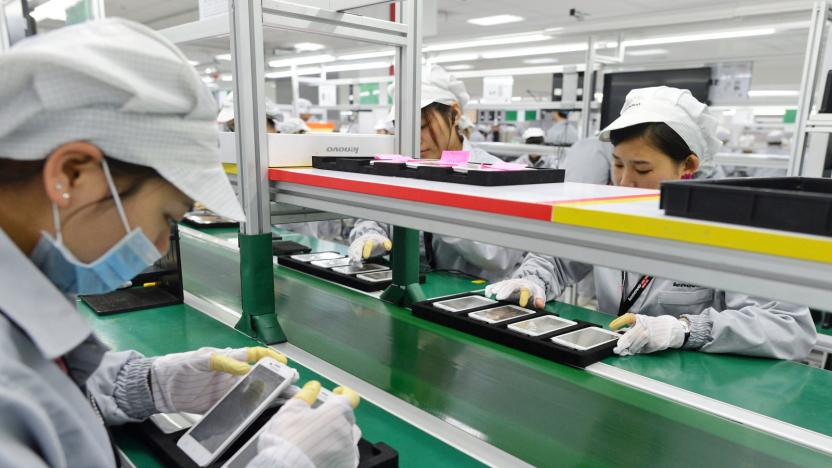
You can’t buy an ethical smartphone today
Any ethical, non-🍏 📱 recommendations? It all started with a WhatsApp message from my friend, an environmental campaigner who runs a large government sustainability project. She's the most ethical person I know and has always worked hard to push me, and others, into making a more positive impact on the world. Always ahead of the curve, she steered me clear of products containing palm oil, as well as carbon-intensive manufacturing and sweatshop labor. That day, she wanted my opinion on what smartphone she should buy, but this time requested an ethical device. Until now, she's been an HTC loyalist, but wanted to explore the options for something better and more respectable. My default response was the Fairphone 2, which is produced in small quantities by a Dutch startup, but I began to wonder -- that can't be the only phone you can buy with a clear conscience, can it?
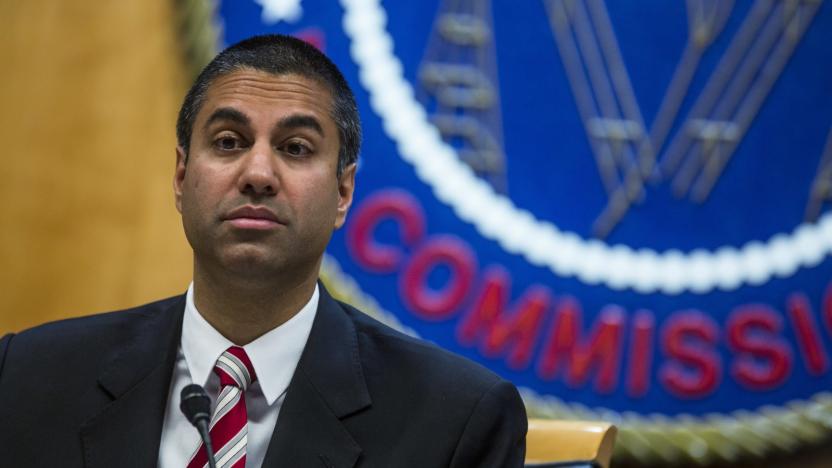
What to expect from the FCC's net neutrality proposal
Today, senior FCC officials outlined the net neutrality draft proposal that will be released by the commission tomorrow. As has been discussed for months, if the new proposal is accepted by the FCC, broadband internet service will cease being subjected to Title II regulations and will return to an information service classification rather than a telecommunications one. Additionally, the order would fully repeal the FCC regulations allowed by the internet conduct standard put in place in 2015, which let the commission investigate practices like zero-rating schemes -- AT&T's Sponsored Data and Verizon's FreeBee Data 360 setups, for example -- and would get rid of the bright-line rules that prevented internet service providers (ISP) from blocking, throttling or fast-laning certain content.

Microsoft plans a 75 percent reduction in carbon emissions by 2030
Microsoft has pledged to slash its carbon emissions by 75 percent by 2030, against a 2013 baseline. By pushing its carbon neutrality plans and renewable energy commitments, the target puts the company on track to meet the goals set in the Paris Climate Agreement, and of course puts a big tick in its corporate social responsibility box.

String a few Galaxy S5s together and you can mine bitcoin
Samsung read the last e-waste report from Greenpeace too, and likely wasn't too happy about the slamming it got from the organization. Which leads us to the Korean electronics juggernaut's system for upcycling old phones. Specifically, the company rigged a bunch of them together and turned them into a bitcoin mining contraption. According to Motherboard, Samsung strung 40 Galaxy S5 together to mine recently, and apparently just eight of them wired together can mine in a way that's more power-efficient than a desktop computer.
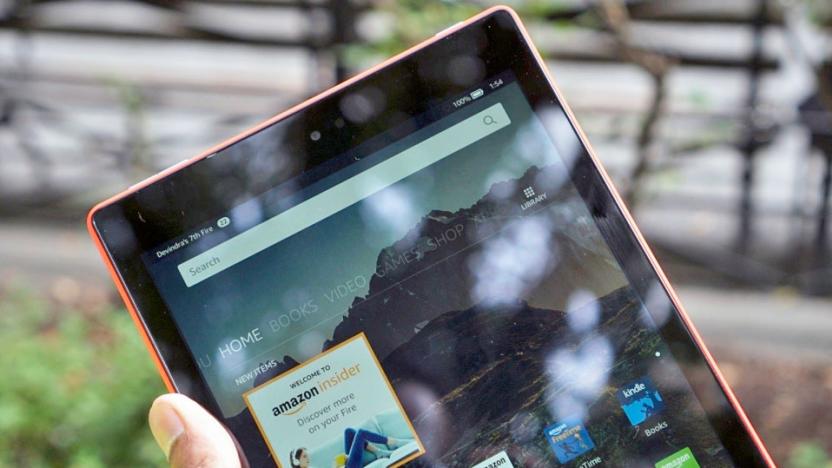
Greenpeace blasts Amazon over poor environmental practices
Greenpeace has made a tradition out of raking companies over the coals when their environmental practices fall short of its standards, and that's truer than ever in the activist group's latest electronics report card. The organization didn't list any major company whose environmental stances (including renewable energy, sustainable products and toxin-free materials) were good enough to merit an "A" grade, and four companies earned an unflattering "F" -- including internet giant Amazon. According to Greenpeace, Jeff Bezos' brainchild falls well short on most marks.
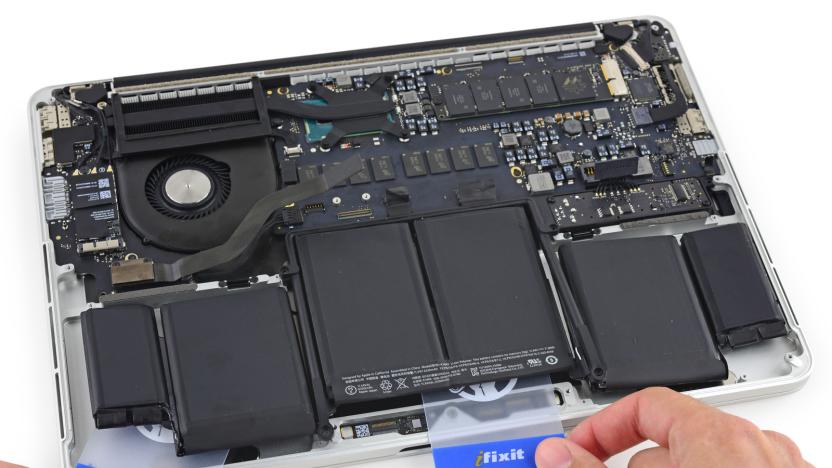
iFixit kit helps with that tricky Retina MacBook Pro battery swap
Gadget repairability is an ongoing issue, one that iFixit has taken on by providing spare parts and manuals for those who want to fix their gear. The company is now offering battery replacement kits for MacBook Pros with Retina Display.

Greenpeace and iFixit slam smartphone companies over e-waste
Greenpeace likes to keep tabs on tech companies, highlighting where they're going wrong when it comes to clean technology and how they can improve. Earlier this year, the organization released its report on how the IT sector consumes energy and they ranked a number of companies on both their energy consumption practices as well as their transparency. Greenpeace's latest report takes on mobile devices and how repairable companies make their products.

London police allegedly used hackers to target activists
If it wasn't already clear why it's a problem when police surveillance goes wrong, it is now. An independent investigator is looking into claims that London's Metropolitan Police used an illegal, roundabout way to access the emails of activists and journalists. An anonymous former worker alleges that a Met intelligence unit took advantage of India "counterparts" that used hackers to obtain email logins for innocent people ranging from Greenpeace protesters to Guardian reporters. The snooping had been going on for a "number of years," according to the insider, and there was reportedly widespread document shredding to cover up the monitoring.
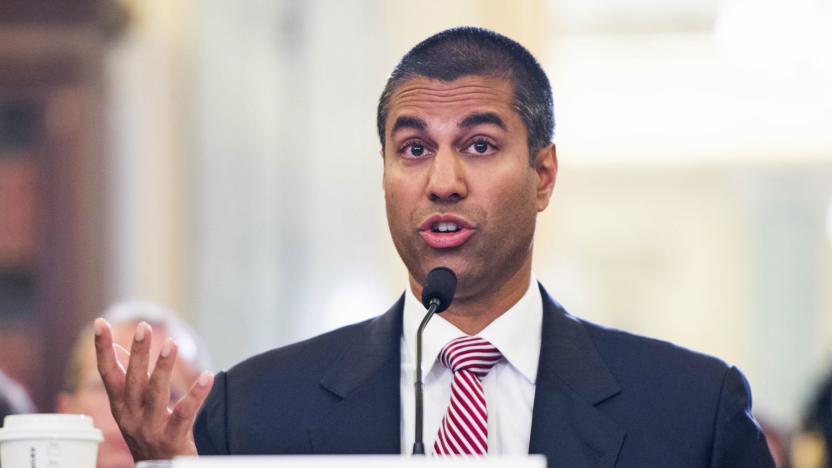
ACLU and 170 other groups ask the FCC to keep net neutrality
The current FCC administration is determined to end net neutrality whatever the cost, but that isn't stopping policy groups from making a bid to save it. Over 170 groups (including the American Civil Liberties Union and Electronic Frontier Foundation) have sent a letter urging FCC chair Ajit Pai, Democratic Senator Bill Nelson and Republican Senator John Thune to maintain the 2015 net neutrality order. They believe that treating internet traffic equally is vital to making the internet an "engine of opportunity," and note that broadband investment is up despite internet providers' threats to the contrary. It's also vital to preserving competition and free speech for smaller outfits, the groups argue.

Greenpeace slams tech giants over dirty data centers
Greenpeace has published its latest report on what powers the internet, and who's working hard to keep our tweeting sustainable. The nonprofit began researching the energy consumption of the IT sector back in 2009, estimating the environmental cost of every Netflix video we watch. It describes data centers as the factories of the 21st century and wants to see companies move across to renewables to keep them going. The report puts Apple at the top of the pile for the third year running -- a far cry from when it came in last place, back in 2011.

Over 100 Nobel winners urge Greenpeace to support GMOs
Greenpeace is being taken to task by 107 Nobel laureates, who have signed a letter asking it to support genetically modified organisms (GMOs), The Washington Post reports. In particular, the band of scientists are pushing Greenpeace to stop opposing Golden Rice, a much-hyped genetically modified strain that packs in beta carotene (which gives it the yellow color). That makes it a potentially useful tool for fighting Vitamin A deficiency, which remains one of the biggest causes of blindness, illness and death in children in developing countries.

Amazon hopes to mend its image by backing a giant solar farm
Amazon has a reputation problem. While fellow tech giants like Apple and Yahoo are considered champions of clean energy, Greenpeace and other advocacy groups regularly knock Amazon for running its servers on dirty power (like coal) and saying little about its renewable energy plans. The company is about to burnish its image in a big way, however -- it just announced that it will support the construction of an 80MW solar farm in Virginia, the largest ever in the state. The eco-friendly plant will supply Amazon Web Services data centers (both present and future) on top of the local grid, so your favorite app or website might run on pollution-free computing when the farm is ready around October 2016.

Apple extends free recycling to all used products - and you might get a gift card
Reiterating what the Apple CEO said at last month's shareholder meeting, Tim Cook still wants to "leave the world better than we found it", and nows he's trying harder to deliver on that. Starting today, all of the company's stores will accept any Apple product for recycling at no charge. Better still, if it looks resalable, the company will offer some store credit (read Apple gift card) to sweeten the deal. Talking to the AP, Lisa Jackson, VP of environmental initiatives (and former EPA administrator) said that Apple wants to "use all our innovation and all of our expertise to make the planet more secure and make the environment better." Now, it might be hard to care less about both the accompanying glossy video from Apple (narrated by Cook and embedded after the break) and the portal site touching on the company's multi-pronged green initiatives, but even our cynicism can't defend against some of the impressive environmental progress made by Cook's team in recent years.

Greenpeace praises Apple for helping to foster a 'green Internet': News from April 3, 2014
For a number of years, it seemed that Greenpeace was all too eager to take shots at Apple. These days, the environmental organization can't help but heap praise upon Apple for its increased attention to renewable energy and its otherwise increasing focus on becoming more environmentally friendly. In a report issued earlier this week, Greenpeace labeled Apple "the most innovative and most aggressive" company in Silicon Valley when it comes to powering its data centers with renewable energy. A number of leading brands, most notably Apple and Facebook, have made significant improvements in their energy transparency, discarding the previous dogma within the sector of withholding energy data due to competitiveness concerns. ... Apple is the most improved company since our last full report, and has shown itself to be the most innovative and most aggressive in pursuing its commitment to be 100% renewably powered. As noted earlier this morning, Apple has announced the dates for the World Wide Developer Conference, to be held June 2 - 6, 2014 at Moscone Center in San Francisco. Unlike past years, when the ticket sales have been an open rush, the company is providing tickets via a lottery that developers can enter today through April 7. Tickets become available for sale on April 25 to those who "win" the lottery. Reuters is reporting that Apple and other major US companies have formed a lobbying group to push back on changes to the patent system that some members of Congress have proposed. The companies, including DuPont, Ford Motor Co., General Electric, IBM Corp, Microsoft Corp, and Pfizer in addition to Apple, formed the Partnership for American Innovation to ask Congress to move carefully on legislation meant to deal with patent trolls. There's concern from the companies that steps taken to stop patent trolls could also hurt innovative companies.

TUAW over-analyzes the Apple event invitation
Shortly after @jdalrymple announced to the world that the invitations for the September 10, 2013 Apple event had been sent out, TUAW Editor-in-Chief Victor Agreda, Jr. noted that @HereIsTrev had tweeted the following message: "Please don't over analyse every last aspect of the apple invite ... oh, too late." Here's our take on the invitation, BuzzFeed-style: There are 25 full or partial circles on the invitation (I counted). 25 is the square of five, which means that the "S" in iPhone 5S means "Five-squared." Of course, these colors represent the spectrum of case colors for your new iPhone. Only two of the circles are green, which Greenpeace should take notice of as it means that the new iPhone is ruining the environment. The four empty circles are representative of the loss of Steve Jobs, Scott Forstall, John Browett and (most recently) Bob Mansfield from the executive ranks of Apple. Blue is the most prevalent color on the invitation, which proves that Bondi Blue will be one of the colors for the new iPhone. The phrase "brighten everyone's day" is all about the new display technology for the iPhone, which will be incredibly readable in full sunlight. Many of the overlapping circles appear to be Venn diagrams. We are doing our best to determine what that means... The fact that Apple couldn't come up with a color for its logo in the center is a sign that the company is fresh out of innovative ideas. Tracing the path of the colored dots reveals a new gesture that'll conjure up the spirit of Steve Jobs. The dots are stylized fingerprints, meaning that the new iPhone will feature a fingerprint-authentication feature. The dot-filled invite also suggests iOS 7 will be sponsored by America's favorite candy, DOTS. See Android KitKat for context. The thin font used on the invite hints at a thinner bezel for the iPhone display. The multiple colors used on the invite suggest Apple will surprise us with multi-user support in a subsequent version of iOS 7.x. Those round circles are indicative of pixels on the screen of Apple's long-awaited HDTV, which will be known as "Munstervision" in honor of the one man who believed in the product, Gene Munster.

Apple's data centers now powered by 100% renewable energy
Apple released the 2012 update of its environmental policy pages and notes that the company is now using 100 percent renewable energy sources -- solar, wind, hydro and geothermal -- at its data centers. The 100 percent renewable energy figure was also achieved at facilities in Austin, Texas; Elk Grove, Calif.; Cork, Ireland and Munich, Germany, as well as at the Infinite Loop campus in Cupertino, Calif. For all of Apple's corporate facilities worldwide, the figure is at 75 percent, and the company says that they "won't stop working until we achieve 100 percent throughout Apple." The company made a commitment to using 100 percent renewable energy at its data centers in 2012 after being criticized by Greenpeace over its energy usage. As the Apple video below demonstrates, the scope of the photovoltaic arrays used at the Maiden, N.C., data center is breathtaking. [via Bloomberg]

Greenpeace study gives Wipro top marks for eco-friendliness, docks Apple, Dell and Lenovo
Greenpeace often seeks to light a fire under companies it thinks are dragging their heels in clean technology, and that's more apparent than ever in its latest Guide to Greener Electronics. The frontrunner this time is chart newcomer Wipro, an Indian tech giant that scores a high 7.1 in the rankings for both green products and aggressive attempts to cut down on pollution. Most everyone else lags behind, however, and their scores only emphasize how little progress there's been. Apple (4.5) is hurt mostly by a lack of transparency; Dell (4.6) is bruised for not living up to its own promises of the past two years, and Lenovo (3.9) is chastised for the absence of clear policies. Greenpeace once more has an agenda in its report -- in this case, drawing attention to India's environmental situation -- but the high-contrast study does show that planet-friendly gadgets can be more than just dreams.

Retina MacBook Pro meets EPEAT standards
Back in July 2012, Apple removed the EPEAT (Electronic Product Environmental Assessment Tool) green certification from its products, resulting in a flurry of excitement when school systems and governmental agencies threatened to drop Apple products from their "approved to buy" lists. About a week later, Apple apologized to customers and put the products back on the EPEAT listing. Now the company is happy to announce that the MacBook Pro with Retina display meets the EPEAT standards. Previously, the MacBook Pro's inability to be "upgraded with commonly available tools" kept it and other unibody laptops off of the EPEAT list. EPEAT has changed its definition to now include hard drives and optical drives that can be connected externally through Thunderbolt and USB 3.0. EPEAT also wasn't happy with the process of disassembling sealed unibody notebooks, since it makes it difficult to do things like replace batteries or recycle the devices at the end of their useful lives. Manufacturers including Apple provided disassembly instructions, and the EPEAT labs were able to take most laptops apart in 20 minutes or less, removing batteries in less than three minutes. What's good for EPEAT isn't necessarily good for all "green" organizations. According to TechCrunch, Greenpeace's Casey Harrell bemoaned the EPEAT change in definition, stating that "It's unclear why EPEAT caved in, but the impact is that EPEAT has confused consumers and businesses who want to buy green electronics that can be repaired and will last a long time, and sets a dangerous trend for the burgeoning market of Ultrabooks."

Greenpeace: Apple's energy policy has improved, still needs to remove the coal smoke from iCloud
Wondering where Apple stands environmentally after the recent withdrawal (and subsequent return) of its laptops and desktops from the EPEAT rating system? Greenpeace has issued a well-timed report, outlining the company's broader back-end energy policies. According to the organization, "Apple's clean energy policies have significantly improved, but the company still gets low scores for its energy choices when compared with sector leaders." Greenpeace applauds Cupertino's commitment to goal coal-free by next year, but wonders aloud how the company will get there, noting that while it has invested in solar and other renewable energy sources, it still buys power from outlets that rely on coal. The organization also took the time to admonish Apple's lack of transparency on its environmental plans.

Greenpeace boosts Apple's rating, but barely
Greenpeace recently released an environmental report on Apple and upgraded the company's score from an F to a D, says a report in Wired. Greenpeace pointed to Apple's commitment to use alternative power at its North Carolina and Oregon data centers as the reason for this small boost in score, but wanted additional details on how the Cupertino company was going to carry out its plans. Apple has said publicly that it expects to power 60 percent of its North Carolina data center and 100 percent of its Newark, California center with renewable energy. Its upcoming Oregon data center will be power by a combination of hydro, geothermal and wind energy. The environmental watchdog also listed several recommended steps Apple should take if it's serious about the environment. These steps include choosing a renewable-powered utility for its Oregon Data center and seeking alternatives to using the "dirty electricity" from Duke Energy. Instead of relying on coal-based power, Greenpeace encouraged Apple to "use its buying leverage with Duke Energy and other utilities to push for cleaner electricity options."










